#Jason Stanley
Photo
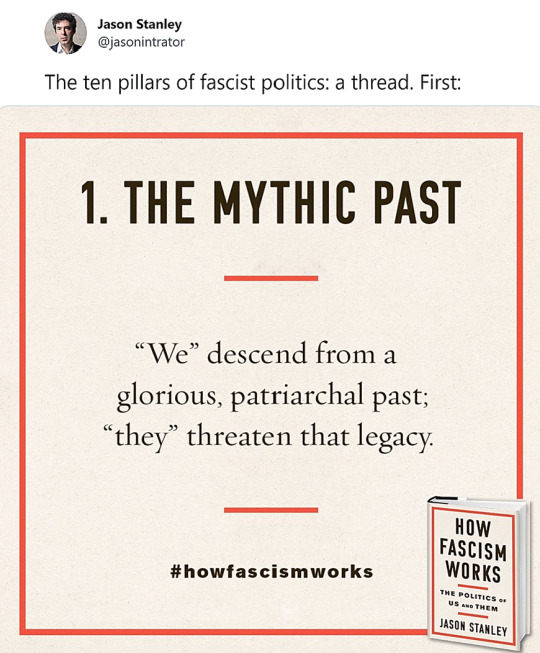
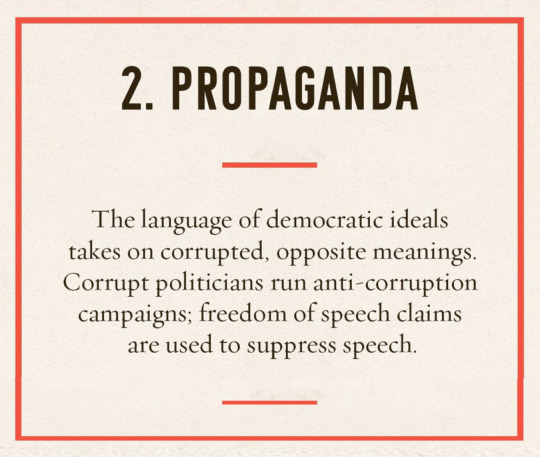

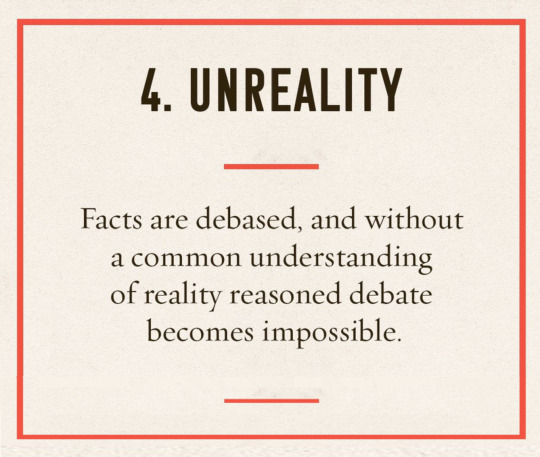
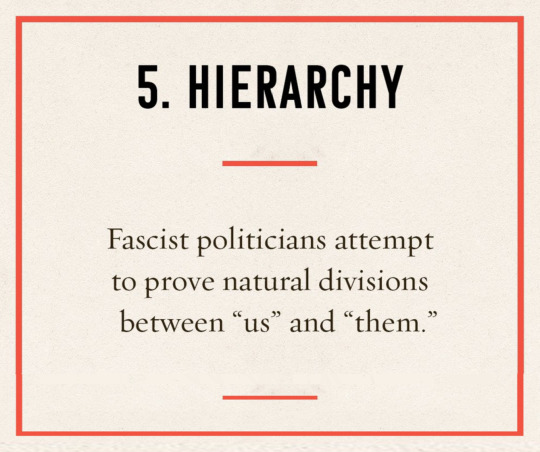
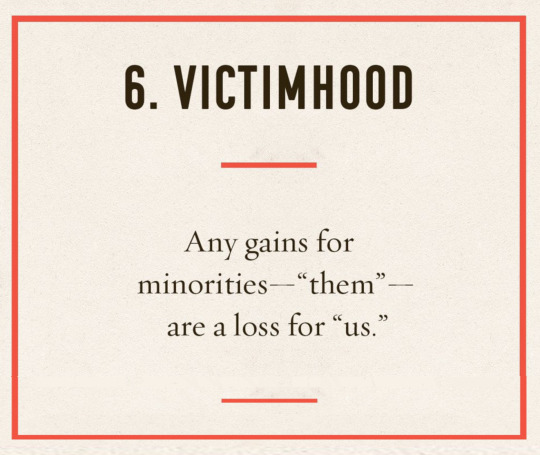
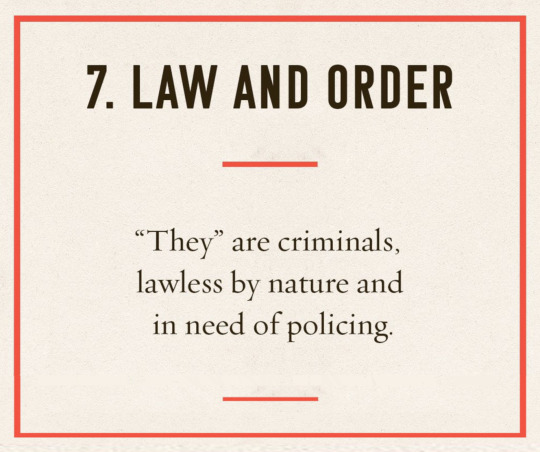

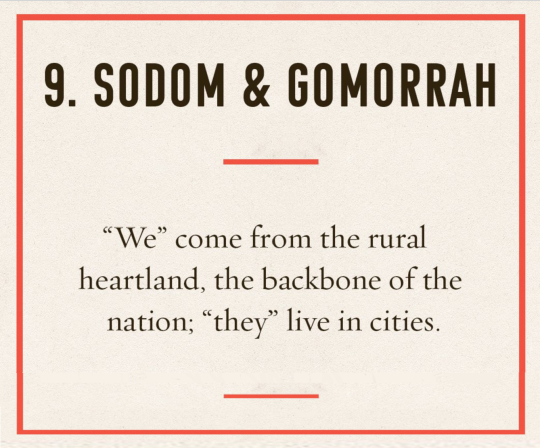
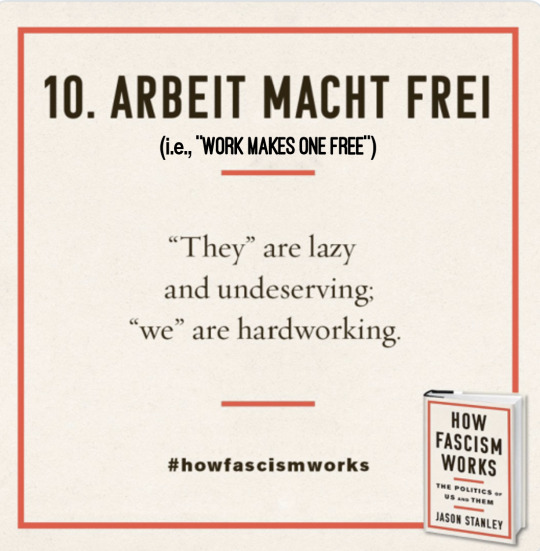
The Ten Pillars of Fascist Politics by Jason Stanley
Above is a July 6, 2021 twitter thread by Yale philosophy professor Jason Stanley, PhD, which outlines the 10 pillars of fascist politics. It shows just how fascist most of the Republican Party has become under Trump’s leadership. The current MAGA GQP has incorporated each of the above 10 pillars into its talking points and philosophy.
This is why the GQP has been up in arms about Biden accurately calling their Trumpist political ideology “semi-fascism.”
Feel free to share this with your relatives and friends who want to defend the direction the GQP has been going in. [Just be prepared when they counterattack to explain why the Democratic Party is not “communist” or “socialist,” but a center left political party, with its most extreme members being social democrats (even Bernie Sanders and AOC aren’t really democratic socialists)].
[edited]
_______________________
Note: The visual formatting of how the original tweet in the thread appears, as well as the visual formatting of pillars number 2 - 9 were modified from their source; furthermore, the translation of “ARBEIT MACH FREI” AS “WORK MAKES ONE FREE” was added to pillar #10.
#the ten pillars of fascist politics#jason stanley#how fascism works#us politics#republicans#gop#gqp#trump#maga republicans#fascism#my edits
9K notes
·
View notes
Text
How does a state become fascist? How did Russia do it?
A special kind of nationalism is needed here. To convince people that you were once great. That once you were a military empire — and then you were humiliated. This is what Hitler once said: “Germany was great, had colonies in Africa, but we were humiliated at Versailles
Under the terms of the Versailles Peace Treaty of 1919, which ended the First World War, Germany had to get rid of its numerous colonies in Africa, China and Micronesia, cede significant territories in Europe and pay reparations to the victorious states of the war in the amount of $442 billion at 2012 prices.. Our empire was taken from us, and our people in other countries and former territories faced genocide. We need a strong ruler to come and restore our empire. To show that we are a big powerful player. And Iʼm ready to do it.”
Putin behaved the same way. He even said that if Russia does not regain its greatness, it will destroy the world.
Also, often in countries that become fascist, there are many economic problems. And nationalism, this feeling of power, can replace food — you will draw your happiness from this feeling, or from the awareness of yourself as a German or a white American. After that, you say that representative democracy is evil. That it allows the existence of LGBT people and the like, that the state is weak because of democracy. Fascism appeals to conservative, religious people who would not call themselves fascists. He tells them: we will protect you from your children becoming gay, from someone destroying your churches. And they often call all their opponents communists. And they get votes. Sound familiar, right?
[...]
It is ironic that the Russians, who were once rightly regarded as the victors over fascism and who now practice fascism, call their war "anti-fascist."
It is necessary to pay attention not to words, but to ideology. Putin can say that he is a liberator — but he is closer to Hitler than to Brezhnev, to Peter I than to communists. And this is an important argument in favor of why the Russians should not leave a single piece of Ukrainian land. For the same reasons why it was not possible to leave, for example, Warsaw under the Nazis.
Now Putin is talking about Ukrainians like Hitler was talking about Jews. He says that there can be no Ukrainians, only Russians, and that all Ukrainians are actually Russians. This position means that he is going to get rid of everyone who speaks the Ukrainian language. That is why all this delusion of the West about territorial concessions must stop.
#ukraine#war in ukraine#russia#russian invasion of ukraine#politics#russo ukrainian war#russian invasion in ukraine#fascism#nazism#yale#Jason Stanley#political philosophy
190 notes
·
View notes
Text
Is Tucker Carlson a fascist? Jason Stanley makes the case.
88 notes
·
View notes
Text

16 notes
·
View notes
Photo

Editor’s note: Bookish Bits is a regular literary writing column on Can’t You Read. Featuring both traditional book reviews, and expanded essays, this book blog encompasses all of my writing about the volumes in my extensive library.
Birdwatching With Liberal Antifascism: A Review of “How Fascism Works: the Politics of Us and Them” by Jason Stanley.
If you've been reading my anti-fascist analysis long enough, you'll know that I'm often quite critical of the imagined efforts of "liberal antifascists" in the Pig Empire. This is in part because foundationally, it's awfully hard to be an effective antifascist without also being an anticapitalist. It has also been my experience however that affluent liberals in positions of actual power are often far less interested in fighting fascists, than protecting their own wealth; if forced to choose between the two, they will quickly abandon all pretenses at opposing the fascist creep and side with hierarchal capitalist power to the bitter end. There is after all a reason I refer to this as our collective "Weimar America" period.
How then are we to approach an intelligent, well-read, genuinely sincere liberal antifascist? Even more perplexing, what does a reasonable observer do when this sincere liberal antifascist has produced what amounts to a fantastic birdwatching guide that allows even small children to recognize fascist politics in action, but offers up only vaguely reformist solutions that flatly will not stop the fascist creep? In short, how do we address a book like Jason Stanley's 2018 work "How Fascism Works: The Politics of Us and Them?" In the end, I've decided that the only honest way forward is to critique what Stanley's book is, rather than focus on what it is not.
So what is it? Expressed simply, How Fascism Works is a collection and analysis of ten objectively fascist political tactics being used to seize control by contemporary far right, ultranationalist movements across the Pig Empire. A study of both rhetoric and process, the author's work isn't about fascist governments, so much as the political movements that put them in power. Although Stanley does spend some time discussing twentieth-century fascist regimes like the Nazis in Germany, or Mussolini's fascist Italy, his focus is very much in the here and now, along with the type of reactionary, eliminationist politics that empowered leaders such as Narendra Modi in India, Jair Bolsonaro in Brazil, and of course Donald Trump in America.
Just what are these fascist political techniques? Stanley identifies them as a call to a "mythic past," inverted reactionary "propaganda," fervent "anti-intellectualism," the enforcement of "unreality," insistence on the existence of a natural "hierarchy," imagined "victimhood," rigid enforcement of authoritarian "law and order," manipulation of "sexual anxiety," casting internal lifestyle differences in the mold of "Sodom and Gomorrah," and otherized presumptions about work ethic and productive value to society. Although each of these pillars are individually present in all types of reactionary politics across the Pig Empire; taken together, they represent clear evidence of a fascist movement in progress - which is the best time to identify fascism; since once it's no longer a fascist movement, but rather a fascist regime, it's far too late to stop it.
Within the narrow, but still relevant confines of studying fascist political practices on the path to power in a faux liberal democracy, I'd have to say How Fascism Works is a smashing success. Drawing heavily from thinkers like Eco, Adorno, and Arendt, Stanley's analysis highlights not only the practices of fascist politicians, but also why they're so effective in convincing the classic "authoritarian personality" type to surrender all autonomy, and indeed rational thought, to fascist charlatans and strongmen. In this regard, Stanley's book might more accurately be called "How Fascism Works (on bootlickers, to dismantle capitalist faux democracies)" instead. Still, for folks primarily concerned with the practical realities of identifying modern fascist movements, and unwinding their poisonous political arguments, How Fascism Works will definitely deliver the goods.
Which unfortunately brings us to the pushback against Stanley's work, and why How Fascism Works is simultaneously a valuable resource, and a dangerous diversion from effective antifascist practices. While many reactionary observers have criticized Stanley for failing to define what fascism is; I don't think that critique is accurate or in good faith. Stanley does define fascism in a purely political context; wingers simply don't like that his definition accurately describes their current political practices. The author clearly states he's not talking about the policies of established regimes, or even the ideology of fascist movements, but rather their methods of acquiring power; you can't crush a guy for failing to write the book you would have preferred to read, and I don't give two wet horse apples whether or not American fascists dislike a Yale professor calling them, well, fascists.
Perhaps more surprisingly however, How Fascism Works has also drawn criticism from some antifascists; particularly those like myself, who largely agree with Trotsky's analysis about what fascism really is, and why it is unleashed by the ruling classes in a liberal democratic society that appears more free than it is. There is literally no anticapitalist component to either Stanley's analysis, or his wholly inadequate proposed solutions; which more or less boil down to "liberal politicians need to be better true liberals and we all need to vote harder to protect our democratic institutions." The end result is in effect a wonderful book about types of nazi birds, and the modern habits of those birds, without much discussion of why the birds are there and what to do if they're trying to kill you for capitalists and hierarchal power.
Does that ultimately matter? Well, that depends on what you want a book like How Fascism Works to accomplish. In light of its widespread popularity, I would say it has been an effective part of the mainstream discourse that has finally at this late a date, allowed liberals to accurately describe the American right's current evolution as fascist; albeit, tepidly so. By that same measure, Stanley's insistence that the liberal democratic order that birthed this fascist movement is the only answer to the problem, probably hasn't helped many of those people become effective antifascists; as evidenced by the fact that Joe Biden has been president for almost two years, and American fascism is still growing politically stronger by the day.
In the final analysis, all of this makes Stanley's How Fascism Works a wonderfully written, extremely informative "birdwatching" book for liberals who'd like to be antifascists, but don't know how to spot and resist the fascist propaganda all around them. If you're looking for an accessible way to get your Dem-voting Auntie who really misses the quiet dignity of bygone liberal politicians like Bobby Kennedy, or John Lewis, onside in the war against contemporary fascism, this is probably the book you want to buy for her. If on the other hand you're looking for a deep theory discussion about why capitalist societies are always capable of turning fascist at any moment, and how we can stamp out the serpent of violent reaction forever; this book doesn't have a whole lot to offer you.
On the basis that you can't punish a book for failing to be something it never promised you in the first place, I'm going to give How Fascism Works three and a half stars. Although I acknowledge that Stanley's work here is excellent, his ideological concessions to capitalist realism make it impossible to call this great antifascist scholarship. Plus I felt obligated to dock him a half star for excessive West Wing-esque rhapsodizing about liberal democratic institutions that can't stop fascism; because they were designed by, and are controlled by, reactionary capitalists who prefer fascism to sharing.
nina illingworth
Anarcho-syndicalist writer, critic and analyst.
You can find my work at ninaillingworth.com, Can’t You Read, Media Madness and my Patreon Blog
Updates available on Twitter, Instagram, Mastodon and Facebook.
Podcast at “Kropotkin’s Barbershop” on Soundcloud.
Inquiries and requests to speak to the manager @ASNinaWrites
Chat with fellow readers online at Anarcho Nina Writes on Discord!
“It’s ok Willie; swing heil, swing heil…”
#Bookish Bits#Fascism#American Fascism#Jason Stanley#How Fascism Works#Nina Illingworth#book reviews#antifascism#US Politics#liberal antifascism#anticapitalism#Donald Trump#Joe Biden#Trumpism
9 notes
·
View notes
Link
Tucker Carlson’s fascism is clearly bound up with his ongoing support for Putin’s Russia.
[I]s Putin’s Russia fascist? In Russia, opposition politicians and journalists are regularly imprisoned or murdered. Russia has passed harsh laws against LGBTQ+ communities. Russia’s ideology is based on a militarized Russian nationalism, and its war against Ukraine is quite clearly genocidal in nature. Just as Nazi Germany represented itself as the defender of Christianity and Europe’s classic traditions against an existential threat posed by leftist atheist Jews, Putin represents Russia as the sole defender of the European Christian traditions against similar existential threats, such as “gender ideology”.
Putin’s Russia is the international leader of the global far right, promoting ultra-nationalism, religious traditionalism and anti-LGBTQ+ sentiment across the world. If Russia is not fascist, then even Nazi Germany in the 1930s was not fascist. As the historian Timothy Snyder has urged, “we should finally say it”: Russia is fascist.
Just as claims to be isolationists by American inter-war fascists were quite rightly taken to be expressions of support for Nazi ideology, there is good reason to take Carlson’s similar claims not as denunciations of American militarism but as expressions of support for Putinism, which he seems largely to share.
We Americans may not like to admit it, but there were sizeable pro-Hitler groups in the US in the 1930s and early 1940s who called for neutrality in order to help Nazi Germany. The pro-Putin right is an echo of that today.
What about Carlson’s scorn for the media, intellectual, financial and political elite, which he lacerates with regularity on his show? Here too there is little ambiguity. Carlson does not scorn all elites – after all, he himself was making as much as $20m a year from Fox news. He only targets certain elites. In the ideology of American fascism, the elites he targets are associated with liberal democracy and Jewish control.
American fascists have always denounced the media, intellectuals and politicians. Carlson is careful to avoid explicitly antisemitic statements. But his show is the home of anti-Soros conspiracy theories. The antisemitism in his programming is clearly dog-whistled, and Jewish organizations have been among the first to cheer his ousting. Indeed, if Carlson did not regularly denounce media, intellectual, financial and political elites, regular targets of Nazi ideology, the case for calling him an American fascist would be much less clear.
The transphobia of Carlson and many in the GOP has a precedent in Nazi Germany.
Nazi ideology supported strict gender roles – one of the central targets of the first mass Nazi book burning on 10 May 1933 was Magnus Hirschfeld’s collection of LGBTQ+ literature, the largest in the world and the largest documentation of gender fluidity (Hirschfeld coined the term “transsexual”). Carlson has used his platform to denounce transgender Americans as existential threats to Christianity. Fascists target cosmopolitan ways as existential threats to masculinity – a viewpoint Carlson also clearly shares.
Finally, fascism praises violence against democracy, valorizing violent street mobs attacking democratic processes and institutions as martyrs to the nation. Here too Tucker Carlson fits perfectly into the tradition.
Gender totalitarianism is a major feature of Putin’s Russia. And as for violence, just look at his war crimes and the recruitment of criminal mercenaries for his invasion of Ukraine.
Fascists in the US can’t help but love Putin. And of course that includes Tucker Carlson.
#tucker carlson#fox news#the far right#fascism#tucker carlson is fascist#antisemitic dog whistles#russia#vladimir putin#war crimes#invasion of ukraine#transphobia#hypermasculinity#gender totalitarianism#nazi germany#interwar pro-hitler groups#jason stanley#владимир путин#путин хуйло#россия#военные преступления#россия – нацистская#такер карлсон#україна переможе
4 notes
·
View notes
Photo
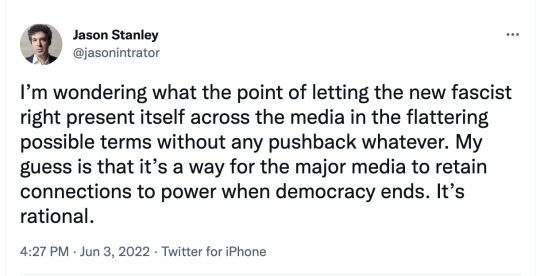

https://twitter.com/jasonintrator/status/1532836495689588736
4 notes
·
View notes
Text

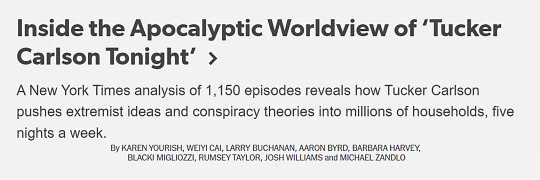
TUCKER CARLSON: 'They' are trying to control 'you.'
Yes, Tucker Carlson is gone from Fox News but other right-wing networks are courting him, so he will most likely continue to have a dangerous influence on a large segment of the population. Consequently, I thought I would share a link from an old New York Times interactive article from April 2022 about Tucker Carlson's "apocalyptic worldview," which has increased fear, hatred and division in the U.S.
One of the things that struck me in this article, is that Carlson works hard to suggest that 'they' (the liberal elites) are trying to control 'you' and to take away 'your' freedoms. Below are some gifs* made from the interactive article that highlight its main points.



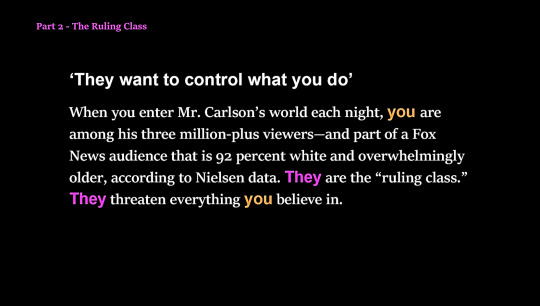
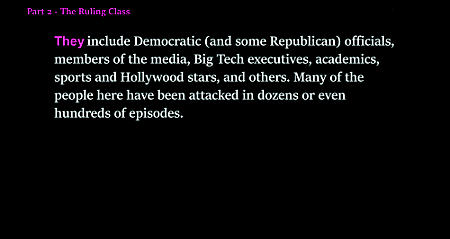


Carlson's 'they' and 'you' rants remind me of a major thesis from Jason Stanley's 2018 book, How Fascism Works: The Politics of Us and Them.
The mechanisms of fascist politics all build on and support one another. They weave a myth of a distinction between “us” and “them,” based in a romanticized fictional past featuring “us” and no “them,” and supported by a resentment for a corrupt liberal elite, who take our hard-earned money and threaten our traditions. “They” are lazy criminals on whom freedom would be wasted (and who don’t deserve it, in any case). “They” mask their destructive goals with the language of liberalism, or “social justice,” and are out to destroy our culture and traditions and make “us” weak. “We” are industrious and law-abiding, having earned our freedoms through work; “they” are lazy, perverse, corrupt, and decadent. Fascist politics traffics in delusions that create these kinds of false distinctions between “us” and “them,” regardless of obvious realities. [emphasis added] (Stanley, 2018, p. 197)
In many ways, Tucker Carlson has worked for years to sow fear and resentment in his right-wing viewers towards 'them.' In doing so, he has helped to set the stage for a neofascist rebellion against liberal values and U.S. democratic institutions.
Tucker Carlson has temporarily lost his platform to spin his fearful, hateful tales--but most likely, he will be back. It is important that we not underestimate how dangerous Carlson's propaganda and worldview are to our democratic republic.
_________
*Note that gif formatting was modified from the original source.
[edited]
#tucker carlson#fearful propaganda#they and you#us and them#the seeds of neofascism#jason stanley#my gifs
103 notes
·
View notes
Text

How Fascism Works by Jason Stanley
Mrs. Fletcher: "Solar Glow"
0 notes
Text
Reading “How Fascism Works” by Jason Stanley (2018, Random House), and this passage stuck out to me:
In Nazi ideology, Jews operate with the same hierarchical views of nature as Nazis do, but use the universal principles of liberal democracy as a façade to advance it.
It reminded me very much of Roman Roy’s various critiques of his siblings’ more liberal impulses.
I think sometimes there is a tendency, especially among Roman apologists (a group among which I count myself) to cut his character some slack, because his siblings, as fellow members of his hyper-privileged caste enjoying the unearned fruits of their position, are to some degree poseurs and hypocrites.
But I also think it reflects a deeper, more ingrained level of fascist ideology in him - the belief that everyone, fundamentally, is playing the same game of striving for dominance.
(More under the cut.)
It’s also interesting how on election night, he is quick to write off the firebombing of the ballot counting centre in Milwaukee as an action by ANTIFA.  It is my interpretation that Roman fully knows better, on a rational level; but the fact the thought is almost-plausible to him - enough that he can argue it on multiple occasions that night with a relatively straight face - seems, to me, to suggest that there is some part of him that expects his opponents to use the same tactics as ‘his’ side does.
And then, the next day, after his father’s funeral - when he is face-to-face with people who are tangibly passionate and upset about the election call he championed - he yells at them that they have no idea how any of this works.
And on the one hand, that can be read as him aggressively telling them to fuck off, because they’re tiny ants whose voices don’t matter, no matter how hard they yell;
or, perhaps, attempting to assert that none of it really matters, because Mencken isn’t really as bad as they think he is, and it’s all just bullshit and posturing (which, I believe, is how Roman, as a queer man who definitely knows he’s queer, justifies Mencken to himself; as evidence, I will point to his insistence to Shiv and to himself on election night that they simply “made a night of good TV; nothing happened.”).
But it could also be read as a cry of frustration; of “Don’t you get it? This isn’t how the game is played. These aren’t the rules. What are you doing out here, with all this sincerity? Put that away.”
Finally, a little (optional) context:
If it seems like I’m bending over backwards to defend my favourite blorbo, that’s probably a somewhat fair critique; if Roman Roy were real, I certainly would never give him this much of the benefit of the doubt.
But I was raised with what I now realize was a lot of really fascist ideology, and examining how that kind of ideology was able, for many years, to nominally coexist with and, at times, override, my better, more human impulses is a very interesting exercise, and one that’s much easier through the lens of a fictional character.
#fascism#politics in succession (hbo)#roman roy character analysis#roman roy’s politics#roman roy and fascism#roman roy and the alt-right#how fascism works#jason stanley
1 note
·
View note
Text
youtube
"The 10 tactics of fascism | Jason Stanley" from Big Think
#The 10 tactics of fascism | Jason Stanley | Big Think#Jason Stanley#Big Think#Some Tunes Shouldn't Be Whistled
0 notes
Text
Jason Stanley – Faşizm Nasıl İşler? (2023)
Sıradan bir demokrasinin karanlık bir faşist rejime adım adım nasıl dönüşebildiğini hiç düşündünüz mü?
Faşizmi gördüğünüz yerde tanıyabilir misiniz?
Faşizm artık geçmişte kalmış bir hayaletten mi ibaret?
Değilse onunla nasıl mücadele edeceğiz?
Jason Stanley çoksatanlar arasına girmiş, tartışma yaratan bu kitabında işte bu endişe verici sorulara bir yanıt veriyor.
Modern dünyanın en tehlikeli…

View On WordPress
0 notes
Link
THE HYSTERICAL STYLE IN THE AMERICAN HUMANITIES:
Perhaps the most prominent representative of this tendency today is one Jacob Urowsky Professor of Philosophy at Yale University, Jason Stanley. Trained in epistemology and the philosophy of language, Stanley turned to politics in 2015 with his book How Propaganda Works. He completed his metamorphosis into a political theorist in 2018 with the best-selling follow-up, How Fascism Works. His books were perfectly of the age: American liberals, horrified by the Trump revolt and desperate to find a definitive tie between Trumpism and the kind of movements that installed Hitler and Mussolini, devoured them. There are fascists on the prowl, and they’re all the people Jason Stanley doesn’t like.
Stanley claims that the goal of his book was not to describe fascist regimes, but rather to delimit the essential characteristics of fascist politics — distilled into a checklist of 10 essential qualities — which may or may not congeal into a regime down the line. This distinction allows him to avoid any mention whatever of Spain’s Franco, Austria’s Dollfuss, Romania’s Antonescu, or Portugal’s Salazar, while every single chapter contains at least one instance of the word “Trump.” But as Samuel Moyn observed in an essay for The New York Review of Books, “If Stanley is right, most of modern political history is fascist, latently or openly.” His definition is gravely overbroad. A vast majority of politics as such — for decades if not centuries, whether left- or right-coded, in America or beyond — contains most if not all of what Stanley believes to be characteristic of fascism.
The professors of “academic Twitter” have subordinated their work as professional intellectuals to the news cycle, yoking their reputations to the delirious churn of outrage media.
Twitter is the mind-killer. You could write a book on it.
0 notes
Text















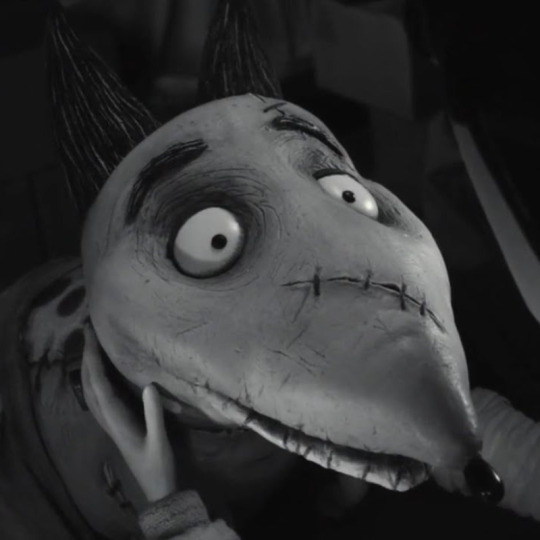














good (and maybe questionable) boys & girls of horror cinema
#toby from friday the 13th viii: jason takes manhattan#stanley from it comes at night#sam from i am legend#harry from amityville horror#cujo from cujo#barney from gremlins#chips from dawn of the dead#buzz from poltergeist#nanook from the lost boys#beast from the hills have eyes#sugar from crawl#thor from bad moon#precious from the silence of the lambs#jed from the thing#jason from a nightmare on elm street 4: dream master#sparky from frankenweenie#ducky from the beyond#lester from halloween#jangers from tucker & dale vs evil#handsome from mama#bugsy from the babadook#zero from a nightmare before christmas#gonk from elvira: mistress of darkness#baron from the conjuring 2#warren from insidious 3#rosie from krampus#shadow from dont breathe & dont breathe 2#scraps from corpse bride#sam from dog soldiers#davie from demons 2
485 notes
·
View notes